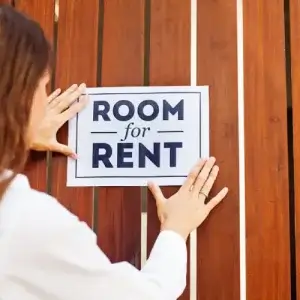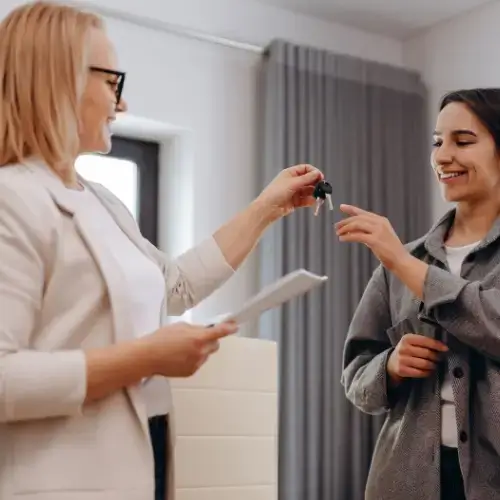Home / Compare Home And Content… / Your guide to renting ou…
Your guide to renting out a room






Key takeaways
- Some steps you could take before renting out your room may include preparing the room, researching rent prices and interviewing potential roommates.
- The type of insurance you can purchase for your home will depend on whether you’re a landlord or a tenant.
- Each state and territory has its own regulatory body for renting.
Should I rent out a room in my house?
As a homeowner, you could earn some extra income by renting a spare bedroom in your house, and that extra cash could help you make your mortgage repayments quicker. Depending on where you live and the legal arrangement you have in place, the individuals renting your room could be tenants, lodgers or boarders.
If you decide to rent out a room in your home, it’s worth checking in with tenancy and local authorities in your state or territory to make sure that you’re compliant with all applicable laws.
How to rent out a room in your house
Check in with your area’s rental authority
 Before you start advertising for housemates, it’s worth checking regulations with the rental authority in your state or territory. Some things they could help you understand may include:
Before you start advertising for housemates, it’s worth checking regulations with the rental authority in your state or territory. Some things they could help you understand may include:
- The rights of both landlords and tenants
- How to meet the minimum living standards set by your rental authority
- Rules for increasing rent
- Regulations around bond payments
- Guidelines on ending tenancies.
Unsure where to go for your state or territory’s rental authority? Find out more about your rights and responsibilities as a property owner where you live.
Research rent prices
To ensure you’re getting a good return on your room, consider researching rent prices in your area. This can help give you a guide on how much to charge for rent when you’re negotiating with a tenant.
Prepare and advertise the vacant room
It’s important to prepare your spare room so it meets the living standards set by your rental authority. This could include:
- Moving non-essential items out of the room
- Fixing broken light bulbs
- Putting curtains or blinds on windows
- Ensuring there aren’t any hazards in the room
- Other general maintenance.
Once your room is ready, you can advertise it on flatmate websites or social media.
Interview potential roommates
 Interviewing potential roommates could help you determine if they’re a good fit for your household. Since you’ll be living with this person, it’s worth asking them the following questions about their lifestyle:
Interviewing potential roommates could help you determine if they’re a good fit for your household. Since you’ll be living with this person, it’s worth asking them the following questions about their lifestyle:
- If they have any pets
- Their work schedule and arrangements (e.g. if they work from home)
- If they smoke or drink regularly
- What their hobbies are
- How often they have friends over.
Ultimately, there are many different questions you could ask potential roommates to get to know them better. Consider what you’ll need to know about your roommate to feel comfortable living with them and be sure to answer any of their questions about you as well – it’s a two way street after all!
Get a written rental agreement
Signing a written lease agreement can help outline the obligations and any agreed terms you have with your housemate. Depending on the state or territory you live in and the nature of the arrangement, there may be specific forms or template agreements that are available for you to use. For example, in Queensland, the Residential Tenancy Authority encourages the use of a Rooming Accommodation Agreement (Form R18).1
Additional things to consider when renting out a room
Check the rental history of potential housemates
If you’re going to open your home to another person, you’ll want to ensure they’re trustworthy. After you interview your potential housemate, call any references they provide to get more information on their rental history.
Set some rules and guidelines for the house
It’s best to lay down a few house rules with any new housemate before they move in. Your house rules may cover things like:
- Cleaning duties
- Chores
- Fridge space
- Use of living space and common areas
- Having guests over.
Review your home insurance
Check your policy’s Product Disclosure Statement (PDS) for inclusions and exclusions related to renting or call your insurer directly to check out what changes you may need to make to your policy. Chance are you’ll need landlord insurance to cover tenant-related incidents.
Talk to a tax professional
To understand the implications renting your spare room could have with the Australian Taxation Office (ATO), always consult with a tax professional. They could also help you determine if you’re eligible for any tax deductions.
For tenants
Tips for tenants renting a room
- Don’t settle for just any property. Work out exactly what you want, not only in the property but also in the type of housemate you want to live with. This will save you time by narrowing down your options.
- Do a thorough inspection of your room and premises. You should ask to view any properties you’re interested in to make sure they match what’s advertised online. If the person who’s advertising the listing denies your request for an inspection beforehand, it could be a scam.
- Keep records of every transaction. To avoid payment disputes, you should keep a record of all your transactions and receipts for rent, bills, bond or other deposits. That way, you can always prove you’ve made your due contribution.
- Consider contents insurance. If you live in a share house or flat, you can cover your own belongings with contents insurance. Just make sure to read the relevant PDS to better understand any conditions of your cover.
Questions to ask when renting out a room
Not all these will be applicable to your situation, but here are some questions you may want to ask if you’re moving into a room:
- How much is the rent and bond payment?
- How long is the lease?
- Does the rent payment include other expenses, such as utilities?
- Are there any house rules I should be aware of?
- Are pets allowed?
Does home insurance cover share housing?
For homeowners
A typical home and contents insurance policy won’t cover damage to your property or belongings caused by a person you’re renting a room to. To cover theft or malicious damages by your tenants, you’ll need to purchase a landlord insurance policy.
For tenants
Tenants living in a share house don’t need to purchase building insurance, but they can purchase renters insurance to cover their possessions. This type of home insurance can cover household items if they’re stolen or damaged from insured events like fires, storms and vandalism.
Know your rights and responsibilities
Whether you’re a landlord or a tenant, the following state government websites can give you a better idea of your responsibilities while leasing or renting:
- New South Wales: Fair Trading NSW
- Queensland: Residential Tenancies Authority
- Victoria: Consumer Affairs
- South Australia: Information and services for SA
- Western Australia: Commerce, WA
- Tasmania: Consumer, Building and Occupational Services
- Northern Territory: Consumer Affairs
- Australian Capital Territory: ACT Government
Meet our home and contents insurance expert, Adrian Taylor
As a General Insurance expert with over 13 years’ experience in financial services, Adrian Taylor works to make it easier for homeowners, renters and landlords to protect their home and contents. He believes it’s important for all residents (whether they rent, own or lease) to have adequate financial cover for their property and belongings in case the worse should happen.
Want to know more about home and contents insurance?
1 Rooming accommodation agreement. Residential Tenancy Authority, Australian Government. 2025.